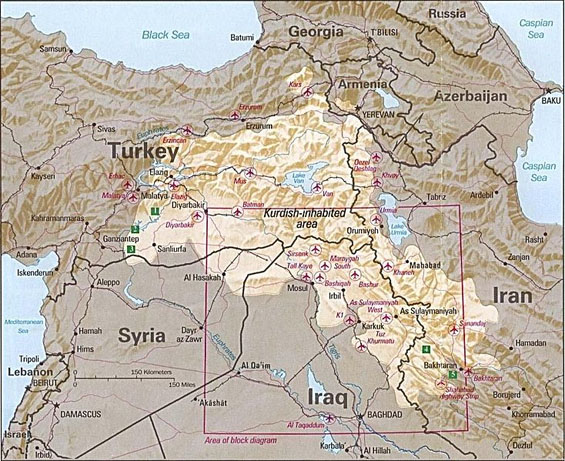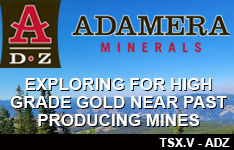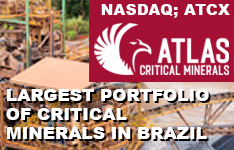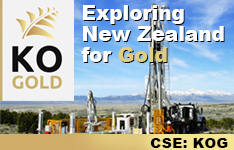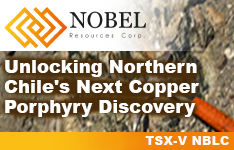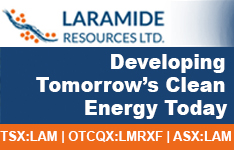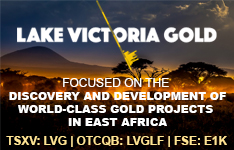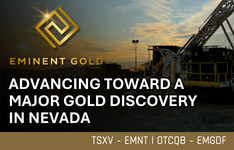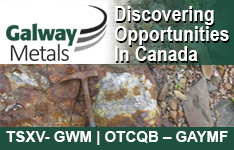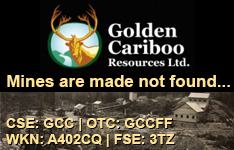The Energy Report: You spent the last three months traveling and logging your discoveries with your S&A Resource Report. What are the major fundamental shifts that have caused the current downturn in natural resources?
Matt Badiali: Oil prices are up and have been staying relatively high, higher than I thought they would, honestly. But there has just been destruction in precious metals, base metals, coal and uranium. There are two factors impacting the prices. The global economy is still in shambles. That hurts demand for natural resources.
And there has been a cooling of China's growth. It is still growing like crazy; it's just not growing at the rate we have seen in the past. That's a function, in part, of the size of that economy. It is just enormous. It can't sustain a double-figure growth rate. So we still see demand there, just not as great as it was.
That reality has pushed down the prices of commodities, which in turn have made the commodity companies less profitable, and in some cases in the gold space, borderline money losers. Investors have pulled out of that market.
We also have a bull market in the Standard & Poor's 500. Investors are fickle. They want to go where they're going to make money. Right now, a lot of the money has moved into the big blue chips.
TER: Let's focus on the bright spot, oil and gas. You visited the Kurdistan region of Iraq. Can you describe to me what it was like to travel there? How were you treated? Did you feel safe?
MB: This was one of the most highly anticipated trips I have ever taken. I woke up in the middle of the night a few times in preparation for this trip. The Western media makes Iraq sound like a live fire zone and that wasn't the case at all. Kurdistan is the northern region of Iraq. It touches Iran, Syria and Turkey. It's an independent, autonomous region within the country run by the Kurds. I flew in to the capital city, Erbil, or "Arbil," through Germany and I flew out through Dubai.
I was shocked. It's the Middle East. I expected desert, camels and burkas, but it's not like that. It's high desert; it reminded me a lot of Colorado and Nevada. I saw lots of wheat fields. The people were wonderful. The women wore traditional or Western-style clothes.
Prior to my arrival, Kurdistan had not had a bombing six years. About three weeks before I went, the city was the victim of a bomb attack against its security apparatus. That put the whole country on alert. There were a lot of checkpoints in and outside the city.
Just to get into my hotel, guards checked the car inside and out and underneath with a mirror. Inside the gate they passed my bags through an airport scanner. To go into the actual hotel, I had to go through a metal detector and a pat down. Then I was in this wonderful, Western-style hotel. I had wireless Internet, all the modern conveniences, excellent food. I was surprised.
The money that has poured into Kurdistan because of oil and gas is astonishing. They call it Little Dubai. Everywhere we looked, we saw massive infrastructure projects. Major companies are building there. Exxon Mobil Corp. (XOM:NYSE) is building a multi-story headquarters there. Marriott had a gigantic new hotel project there. Hilton has two properties going in. All the oil service companies are there. I visited the Family Mall and short of the metal detector to get inside, you might as well be in Cincinnati. I felt like I could have been in the US.
TER: Is there a premium price for doing business there?
MB: You do have to pay a price for security. Inside the city, it's very safe. Outside the city, it's a little different. I didn't know what to expect, so I hired a security team. Each car came with two guards armed with AK-47s. That may have been overkill for some areas. And some places I wanted to go, like Kirkuk, they said it wasn't safe even with security.
That added security has to impact the bottom line for companies to work there. For example, a typical well pad in Texas includes a trailer and a guard to keep wanderers out. But in Iraq, you build a compound and employ armed guards. Plus, the stakes are also higher in the Middle East because there is a lot more oil on each site. A well drilled on one of these Iraqi fields flowed 42 thousand barrels a day (42 Mbbl/d). Compared to 300 barrels per day (bbl/d), which is the typical output of a Texas Eagle Ford well, at $100/barrel (bbl)—that's $4.2 million (4.2M) worth of oil every day.
TER: Is production back to the level it was before the 2003 invasion?
MB: No, and progress is slow. When Chevron Corp. (CVX:NYSE) and Exxon Mobil came in to southern Iraq to help bring the giant oil fields back online for Baghdad, they found navigating the red tape was impossible. There is also a lot of friction between the Iraqi Arabs and the Kurds so getting the oil out of Kurdistan is a challenge.
It looks like there is an agreement now to ship it out through Turkey, but it is a political balancing act. I believe we're going to see a lot of oil coming out through Turkey within the next six years. The plan is to have 2 million barrels oil per day (MMbbl/d) going from Kurdistan out through Turkey by 2019.
TER: Is it mainly the juniors that are working on these projects or is this a job for the majors? Who's actually taking advantage of the opportunities there?
MB: The juniors were the first movers. This area opened up not long after the war ended. A couple of Canadians led the way, ShaMaran Petroleum (SNM:TSX), WesternZagros Resources Ltd. (WZR:TSX.V) and Heritage Oil Corp. (HOC:TSX; HOIL:LSE).
Those companies made the initial discoveries. The problem is that a discovery is a science project until you can actually get the stuff to market. That's been the hard part. In fact, one of the fields in operation now uses 700 trucks/day because there's currently no pipeline.
The majors have started to quietly move in. There has been a lot of resistance and some false promises from Baghdad. Chevron and Total S.A. (TOT:NYSE) are in Kurdistan now with all the other big companies. The attraction for the majors is that this is a part of the world where you can make a discovery that can materially replace reserves for even the biggest companies.
The attraction for the Kurds is that the major oil companies will develop these fields the best. They have experience in the region; they know how to get the job done and they have clout. The little guys may be technically solid, but it's going to take more than solid technique here to get all this stuff done.
So the answer is both. The juniors are in there now. The majors are moving in, and the majors are probably going to consolidate this area within the next two years.
TER: I know you visited some juniors. What's an example of a junior that's operating in the area?
MB: WesternZagros has a couple of big exploration blocks in the Kurdamir region of Kurdistan. I had a chance to meet with their geologists and members of the team. These people are well informed and technically savvy.
"The money that has poured into Kurdistan because of oil and gas is astonishing. They call it Little Dubai. Everywhere we looked, we saw massive infrastructure projects."
They put together a great information session, which they allowed me to attend. The lead lecture was provided by an energy analyst who worked in the Bush White House and was a diplomat prior to jumping over to the private sector and working for the Kurds. He presented an excellent summary of the many influences affecting the oil and gas industry in Kurdistan.
I was very impressed by WesternZagros. The company is educated on the region, which is critical to success. Companies have to be sensitive to the religious and political differences between the Kurds and the Arabs. The two groups are distinctly different. The Kurdish population is split and isolated due to the arbitrary boundaries drawn after World War II. These boundaries left isolated pockets of Kurds separated in three different countries.
TER: Understanding that balancing act is probably key for WesternZagros to be able to operate successfully in the area.
MB: Absolutely. And it's important for WesternZagros' investors to understand, too. Investors boarded a bus—not an armored bus because this area really is very civilized—and went to look at the property for themselves. WesternZagros' leases are in the southeast part of Kurdistan, on trend with the giant Kirkuk oil field, which up until the discovery of Ghawar in Saudi Arabia, was the largest in the world. The oil is lighter and sweeter, which makes it more valuable.
The company has two production sharing contracts that are about 500,000 acres. It was the fourth international company to come into Kurdistan, so this company was an early mover. The company is fairly small. It has almost 5 billion barrels oil equivalent (Bboe) of prospective oil. It's an interesting little play. When the rollup happens, WesternZagros will be included in that group, absolutely.
TER: If Iraq and Iran increase production in 2014, what impact could that have on the Organization of the Petroleum Exporting Countries (OPEC) and oil prices?
MB: OPEC has decided it is going to hold total production steady, so it won't have a big impact on oil prices, but everyone else in OPEC has to produce less oil to do that and accommodate a new stream of 1 MMbbl/d. The one good thing for OPEC members is that Libya is still offline and probably not coming back for a long time. That means there will be room to accommodate more crude oil.
What will probably happen is that OPEC members will cheat, so they'll have their quota and some extra tankers will fill up "accidentally." We may see more oil on the market than the official totals. We'll have to wait and see if the demand can sop up that leakage.
The U.S. is importing a lot less oil from OPEC, but the majority of OPEC's oil was going to Asia anyway. So the big question will be: What's going to happen to China's demand? All indications are that the Chinese are in love with automobiles, which means the demand for oil will be there. We shouldn't see too much of a decline in oil prices.
TER: Let's switch to North America, where the controversy is about fracking. Some communities have proposed bans, including Colorado, where you visited recently. As a trained geologist, please give us your perspective on the safety profile for fracking.
MB: Fracking is only controversial because people don't understand it. It's been completely misrepresented. Fracking is not new. We've been fracturing rocks in oil wells since the 1940s. Back then, they used "torpedoes"—little metal gizmos filled with nitroglycerin they dropped down vertical oil wells and then ran like crazy. It would hit the bottom and blow up. We have been trying to crack rocks to release oil for 70 years.
The true revolution isn't due to fracking, but rather to technology.
The computer revolution that allowed us to have cellphones that are more powerful than desktops we had 10 years ago also had a dramatic affect on oil exploration. It allows us to drill a mile and a half down and a mile and a half sideways and end up at a spot the size of a coffee can. You can pick your point now. That's tremendous. We could never do that before.
Shale beds are the source of the all the oil we have found so far. It is like a carpet soaked full of oil and gas. Drilling conventional oil fields is simply tapping the lucky spots in the rock. Places that happen to trap the oil as it moved out of the shale. Thanks to the computer revolution, we can move from trapped oil to the source of the oil itself.
There is still a massive amount of oil and gas in the source rocks—the shale. However, the layers are thin, relatively speaking, so you have to be precise. Our ability to crack these rocks in very precise increments and produce them unlocked the potential we are benefitting from today.
Fracking is the one component of the shale revolution that people are afraid of. And they shouldn't be afraid. The techniques are safe, when done correctly.
"Investors who are willing to invest where other people aren't investing can buy the biggest player in the space for really cheap."
We don't use nitroglycerine anymore. Now we typically use a combination of water and guar gum, a food additive. It is very safe. The wells that are tapping shale are not near drinking water aquifers, in fact they are about a mile below the aquifers, for the most part. Some are deeper.
Simple economics (water seeping into a well would make pumping too expensive) and strict laws ensure fracking will not mix petroleum with water sources. In addition to distance, safety precautions include casing the wells with solid steel tubes to prevent anything inside the well from getting out. If there is an accident, it is due to human error, not fracking. If you don't cement the casing in right, or you damage the casing and don't fix it, or you spill frack water into a creek—those things cause problems.
There are also laws and safety precautions around how the fracking water is treated once it is pumped out. If that spills, it's no different from a gas station, it can leak dangerous chemicals into the ground. That is why there is an entire industry built around cleaning up spills.
At the heart of the "fracking controversy" is a large part of the population that would like renewable energy to be the only source of energy in the U.S. They want to make biofuels. They want to use wind and solar energy, and that's it.
In a period when we believed that oil supplies were running out and natural gas supplies were running out, there was a lot of political clout thrown at alternative energy as a national security issue. We had to import our oil from OPEC, and natural gas from Qatar, and it was scary. It was going to be expensive, and we were going to be beholden to foreign governments, and it was just a terrible, awful, scary thing.
Now, instead of buying natural gas from Qatar for $14/thousand cubic feet (Mcf), it is available domestically for $1.80/Mcf because there's so much of it. In fact, we stopped drilling in lots of places because economically it didn't make sense. Cheap natural gas kills the ability of renewable energy to compete.
It can work, but we're going to pay double or triple our current electric bills. The alternative energy faction doesn't want cheap hydrocarbons to continue to produce electricity because it hurts their cause, but it helps electricity users, private citizens and businesses.
TER: We've heard about problems with faster-than-expected decline rates in some shale wells. Can you explain how shale well development and life cycle is different from those of conventional wells?
MB: There is a big decline rate. There absolutely is. Initial production will be the most oil or gas produced from a shale well in its lifetime. It's a pretty exponential decline, and then it flattens out. The thing that we don't have good data on right now is how long these wells will last because we just haven't been doing it long enough.
The oil supply in the shale wells is different from the oil in a conventional well. Conventional wells tap a reservoir. You can think of it like a glass of iced tea, where the tea moves around the ice cubes. A conventional well is like putting a straw in and sucking the iced tea out. If you put two straws in it will lower the iced tea in the glass a lot faster.
With a shale well, you aren't dealing with a reservoir. The reason we have to crack the rocks is that the shale is a dense rock saturated with oil. Each shale well is its own glass of iced tea. That means you can put shale wells close together and they don't sip from the same glass. That means the volume of oil you can get out of a shale layer is much larger than you would get out of a conventional oil field.
We're seeing that with the Bakken. The Bakken is the big giant oil shale up in North Dakota that no one believed would ever produce oil. The original by the U.S. Geological Survey (USGS) estimation was for 151 MMbbl oil total. They were so wrong. The production rates just keep going up. Since 2008, the Bakken has produced 450 MMbbl oil. That's three times the initial estimate.
It defies all the arguments that rapid declines in shale wells are going to bust this trend. I look at this and I see the innovation equivalent of the Internet for energy. Cheap energy is the best possible thing that ever happened to North America and to the U.S. People need to understand just how transformative cheap energy really is to their lives.
TER: Also, not all shale is alike. How much of the success of a well is based on geology and the type of oil and gas in the resource versus location, the ability to move that resource to consumers? How much is just good management?
MB: You hit the nail on the head. You need several things. You need the right rocks. There have been some colossal failures in shale plays. There have been some false starts. SandRidge Energy Inc. (SD:NYSE) raised a lot of money to develop the Mississippian (which is actually in Oklahoma). And it made promises about production rates, but the rocks it drilled initially turned out to be better than the rest of the trend play. So the company couldn't fulfill the promises because there just wasn't enough oil. The geologists didn't have the technical understanding of the rocks they should have had before they borrowed all that money. SandRidge imploded and the stock was demolished. Having the right rocks is critical.
Takeaway capacity is also critical. There was a time when companies were sitting on hundreds of wells that had been drilled but not completed because they didn't have pipeline capacity to get the stuff out. I'm sure you've heard what's happening up in the Bakken Formation where they're hauling oil by rail.
These days, it's as hard politically to get a pipeline permit as it is to actually build one. There is the whole Not In My Backyard (NIMBY) factor. People like the idea of domestic oil production, but they don't want an oil pipeline anywhere near their houses. So they're putting it on railcar. It's twice as expensive to move oil by rail as it is to put it in a pipeline and nowhere near as safe. But it is expedient and sometimes the only option. I think we're going to see a lot more rail because you just can't get pipelines permitted.
TER: Is that more of a problem in Canada than in the Midwest?
MB: I think it's equal. I think there's going to be more political pressure for Canada to build some big pipelines. Historically, all of Canada's pipelines pointed south because the world's largest consumer of oil and gas is in the US.
Now the U.S. is importing less because it produces its own higher-quality crude. That makes the new market for Canada's oil either Europe or Asia. However, it has to build a pipeline across the country or get the Keystone Pipeline through the middle of the U.S. to the ports in Houston.
It is a no-brainer in my opinion. We should let Canadian crude oil come to our ports. Cheap energy could be an enormous boost for both our economies. We're already seeing it. BMW relocated a plant to the U.S. An Egyptian fertilizer company is building a plant in Iowa. A gas-to-liquids plant is going to Louisiana in a parish where the unemployment rate was ridiculous. This is the sort of thing that can happen when you have cheap, abundant energy. I'm a huge fan.
But because it is so difficult to get oil to market, places in the Bakken are selling crude at a discount to West Texas Intermediate (WTI). Canada's crude oil is trading at massive discounts. It's hard for oil companies to make money when they can't get it to the markets that have the demand.
TER: Let's talk about some of these places. According to the Fraser Report, nine of the 10 best places to invest in oil and gas exploration worldwide are in North America, the top three being Oklahoma, Mississippi and Saskatchewan. I understand that the Tuscaloosa Marine Shale in Mississippi and Alabama is one of your favorites. How does it compare with the other shale resources?
MB: It's new, so it's really an unknown commodity right now. What we've seen in each of the shale plays is that the first-moving companies figure out the peculiar combination of the best rocks and the best development techniques. For example, Continental Resources Inc. (CLR:NYSE) is the Bakken company. It has been one of the most amazing success stories in the shale plays, period. Coming out of 2009, Continental was a $14 stock. It touched $121/share in October of this year because of production growth out of the Bakken shale. The company has done the work and found the best way to drill the Bakken, and the numbers prove it. Continental has a tremendous story. Several other companies have done the same thing in their own particular shales.
Sanchez Energy Corp. (SN:NYSE) is another great example. Sanchez ownership has been active in the Eagle Ford and now it is bringing that expertise to the Tuscaloosa Marine Shale in Mississippi and Louisiana. The Tuscaloosa Marine Shale is an analog to the Eagle Ford. When the sea level was higher, it was part of the basin. That means it has great basics—the right rocks, with the right combination of organic carbon and thickness. It should be an ideal place to use understanding of shale to develop a new region.
A few small companies operate there. Lots of infrastructure is already in place. I think it will do very well.
TER: Compared to Continental, does a company like Sanchez have more upward room to grow?
MB: Yes, it's a scale thing. Continental is a $19 billion (B) company. It takes a lot of new oil production to generate material growth for Continental. Sanchez, on the other hand, is fairly small. It just had its initial public offering. It's a $1B company, so it has lots of room to run. It doesn't take anywhere near as much oil production for a company like Sanchez to grow. Companies like Sanchez that are hungry, smart and run by great operators will really benefit as production increases.
TER: You mentioned the Eagle Ford Shale. I've heard that production targets estimate tripling production there in 20 years. Who is going to be the beneficiary of all of that growth?
MB: A lot of companies are down there nowadays. When Eagle Ford initially opened up, nobody thought it extended more than a couple of counties in southeastern Texas. Now, it extends under the border of Mexico and it's moving north toward Houston. This play just continues to get bigger. The problem is none of the companies there are cheap anymore. I do like the companies that are going to be transporting that oil out of the Eagle Ford, the pipeline plays. There are some interesting plays in logistics.
TER: Any other insights for investors preparing for 2014?
MB: I'm going to give you an insider tip. The secret to investing in commodities is to look at what people hate. Go to the places where people think you are nuts.
For instance, I like coal because it's cheap. Coal mines are going out of business left and right, but there are companies in the space making a lot of money. I told my readers to buy Peabody Energy Corp. (BTU:NYSE). Peabody is basically the Exxon Mobil of the coal space. It has operations in the least expensive district in the U.S., the Powder River basin. It owns the world's largest coal mine and it produces coal in Australia that gets sent to Asia.
In the U.S., coal was just destroyed by low natural gas prices. But in the rest of the world, coal is in high demand. Japan is shifting to coal from nuclear. Germany is doing the same. China burns an enormous amount of coal. The Chinese government is shutting down several coal mines a week because they aren't safe.
That means investors who are willing to hold their nose and invest where other people aren't investing can buy the biggest player in the space for really cheap. Then you can send me a thank you note next year.
TER: Thank you.
Matt Badiali is the editor of the S&A Resource Report, a monthly investment advisory that focuses on natural resources, including silver, uranium, copper, natural gas, oil, water and gold. He is a regular contributor to Growth Stock Wire, a free pre-market briefing on the day's most profitable trading opportunities. Badiali has experience as a hydrologist, geologist and consultant to the oil industry. He holds a Master's degree in geology from Florida Atlantic University.
Want to read more Energy Report interviews like this? Sign up for our free e-newsletter, and you'll learn when new articles have been published. To see a list of recent interviews with industry analysts and commentators, visit our Streetwise Interviews page.
DISCLOSURE:
1) JT Long conducted this interview for The Energy Report and provides services to The Energy Report as an employee. She or her family own shares of the following companies mentioned in this interview: None.
2) The following companies mentioned in the interview are sponsors of The Energy Report: WesternZagros. Streetwise Reports does not accept stock in exchange for its services or as sponsorship payment.
3) Matt Badiali: I or my family own shares of the following companies mentioned in this interview: None. I personally am or my family is paid by the following companies mentioned in this interview: None. My company has a financial relationship with the following companies mentioned in this interview: None. I was not paid by Streetwise Reports for participating in this interview. Comments and opinions expressed are my own comments and opinions. I had the opportunity to review the interview for accuracy as of the date of the interview and am responsible for the content of the interview.
4) Interviews are edited for clarity. Streetwise Reports does not make editorial comments or change experts' statements without their consent.
5) The interview does not constitute investment advice. Each reader is encouraged to consult with his or her individual financial professional and any action a reader takes as a result of information presented here is his or her own responsibility. By opening this page, each reader accepts and agrees to Streetwise Reports' terms of use and full legal disclaimer.
6) From time to time, Streetwise Reports LLC and its directors, officers, employees or members of their families, as well as persons interviewed for articles and interviews on the site, may have a long or short position in securities mentioned and may make purchases and/or sales of those securities in the open market or otherwise.


